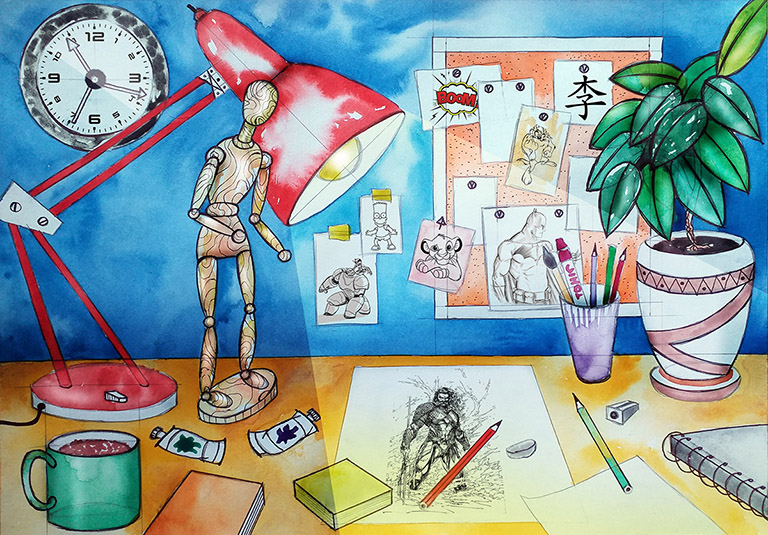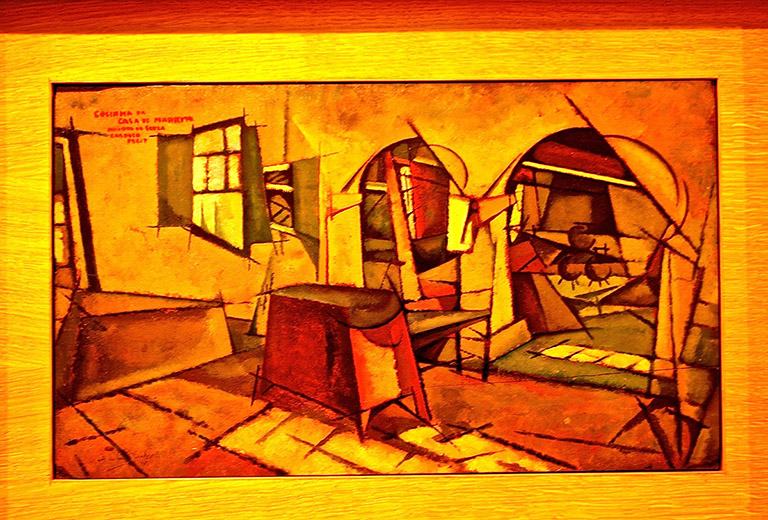Craig Bartholomew is the Director of the Kirby Laing Centre.
Korn’s book is full of fruitful insights. Through finding his vocation he has, as it were, backed into a host of crucial insights about furniture, craft, the problems with contemporary culture, the meaning/s of life and the role of worldviews. There is so much to affirm and to celebrate in his book. From a Christian perspective it is as though Korn has stumbled across a dimension of reality and pursued it faithfully, thereby coming up with a host of refreshing insights.
One way for us to respond to his journey is to spend time with well-made furniture, craft and art. In working with craftsmen and artists I have always found it to be a different order of experience when moving from talking about art or craft to actually experiencing it. In one form or another craft is part of our everyday lives and a place to begin is to take note of it. In our consumerist West we may well find that our houses and workplaces are full of cheap mass-produced goods. Does this matter, you might well ask. Isn’t it the spiritual that really matters whereas our cups and mugs, the furniture in our houses and offices are of altogether secondary significance? In brief, No!
Korn’s work serves to remind us of the ever-present danger of that ancient heresy of Gnosticism, so ably rebutted by the early church father Irenaeus (c. 130–202 AD), whereby we denigrate the earthy/ly as somehow not spiritual. I love Korn’s reference to the “earthly nature of our spiritual appetites.” Christians too often succumb to a Greek dualism between spirit and matter so that all that really matters is the spiritual. The biblical distinction is, however, between Creator and created so that, while we should never equate the creation with the Creator, nor should we fail to recognize that. as creation, all of our earthly existence was created good and, in this sense, is thoroughly spiritual. Humans are embodied creatures, which is one reason why we choose to have chairs to sit in, and cups to drink out of. Different cultures actualize our embodied needs in surprisingly different ways, but the nature of our embodiment means that, one way or another, they will be actualized.
The critical question is, does it matter how we go about living out our embodied existence? To cut to the chase, if our embodied nature is a result of God’s good creation, and if through Christ he has worked at great cost to redeem the whole of life and to lead it towards its destiny, not back in Eden, but in the new heavens and earth in which are gathered the treasure of the nations, then we dishonour God when we fail to take these earthly dimensions of our lives seriously.


The theologian Karl Barth speaks of ethics as a response to “the question what is good human action” (CD 3.4, 3). He rightly situates ethics as a “task of the doctrine of creation (CD 3.4, 3),”[1] read through the lens of God’s grace to us in Jesus Christ. Creation leads us to take the whole embodied person seriously. Barth observes that “The command of God does not hang ineffectively in the air above man. Its particular aim and concern are with him and his real activity.… man’s real activity is always concrete. The acting man himself is concrete, i.e., this or that man who in his place and skin cannot be compared, let alone exchanged, with any one else. And the field of his conduct is a tremendously varied sphere of conditions and possibilities determined by time, space, nature and history (CD 3.4, 5).” Craft is one of those varied possibilities open to humankind, and thus rightly comes under the purview of Christian ethics.
Barth speaks evocatively of the human response to the way in which God has come to us in Christ as “not monotonous, colourless and formless” but “articulated, colourful and contoured (CD 3.4, 17).”[2] Ethics does involve the “invocation of God” but it is not the reductionist “work is prayer.” “What is added is the statement that the Christian life must be a reference to the work of God, a reference that is formed by the work of God to correspond to itself. Our living becomes a mirror of God’s action (CD 3.4).”
When we gather for worship our lives should be re-centred in the life of God, but this is the living God, creator and redeemer. Far from detracting from the visceral creation, we should leave church with a sense of the whole creation before us as the theatre of God’s glory, in which we are to live and work, spreading the fragrance of his character in a riot of song, love, dance, music, work and craft. As O’Donovan perceptively says of post-communion liturgy: more can be done “to spread before us the glory of a fully human life into which we are now free to enter.… rich in possibilities of every kind of action and relationship,”[3] including craft!
What then of talk about craft? O’Donovan notes the indispensability of speech: “The speech of ethical discourse shapes and gives structure to the action; only because it is formed by speech can our action ‘refer,’ speak back to God’s act” (Liturgy and Ethics, 5). Here, I think, is where Korn’s need for a discourse within which to understand his passion with furniture making fits. With time he experienced the need – and has the ability – to articulate how his passion fits within human life and the world around us.
O’Donovan identifies three levels of ethical discourse: basic moral categories, integration into a whole moral vision, and interpreting the world in the light of that vision (Liturgy and Ethics, 5). Intriguingly, he employs a furniture metaphor for the second element: “If the categories are the furniture of the mind, what we are talking about here is arranging the furniture to make a room. You can put good pieces of furniture together in a way that makes a furniture depository! To make the room, each piece of furniture needs to be in the right relation to the others, it has to be deployed, and so it is within our moral categories. To have a moral vision which will enable us to think out into unfamiliar and strange tasks, we need more than a collection of ideas. They have to interact to make a structured whole” (Liturgy and Ethics, 12).
Here we arrive at what Korn calls mental maps and what I prefer to refer to as worldviews. Mike Goheen and I define a worldview as
an articulation of the basic beliefs embedded in a shared grand story which are rooted in a faith commitment and which give shape and direction to the whole of our individual and corporate lives.[4]
A crucial difference between us and Korn is that he sees mental maps as entirely human constructions formed from the materials of history available to us at our time and place. While a Christian perspective affirms the constructive role we play in forming – albeit subconsciously – our worldview, Christians find in the grand, sprawling, capacious metanarrative of Scripture the true story of the whole world, and – should – allow it to be their default mode and the primary source from which they construct a vision of the world.
What I find so intriguing about Korn is the way in which he regularly resorts to Christian language as he seeks to explore his own worldview and how it relates to furniture making. Perceptive readers will have noted this in Part 1. Even some of his chapter headings are telling in this respect: “Second Epiphany”; “A Miracle at the Heart of the Ordinary.” The latter seems to me utterly central to Christian spirituality and also reminiscent of Eric Auerbach’s extraordinary discussion of the narrative in Mark’s Gospel of the betrayal of Jesus by Peter,[5] in which narrative Auerbach discerns a movement of the spiritual among the most ordinary, something which Greek and Roman literature was unable to achieve, and which Auerbach, a Jew, relates to the Christian doctrine of the incarnation.
I am grateful for Korn’s exquisite book. One longs for the day when such passion and exploration characterizes Christian communities. At the same time, I think that Korn tends to absolutize craft in the context of human autonomy and so ends up with the ambivalence with which he ends his book. A place needs to be found from which craft can be decentered so that its true brilliance can shine forth without it becoming an idol. A place needs to be found where craft and virtue embrace. Christians believe that such a place is Jesus Christ.
[1]. Cf. Oliver O’Donovan, Resurrection and Moral Order: An Outline for Evangelical Ethics (Grand Rapids: Eerdmans, 1986), for one of the best articulations of the relationship between Christ and creation.
[2]. I am indebted to Oliver O’Donovan, with response by Michael Vasey, Liturgy and Ethics. Grove Ethical Studies 89. (Bramcote, Notts.: Grove Books, 1993) 4, for drawing my attention to this easily overlooked statement by Barth.
[3]. Oliver O’Donovan, Resurrection and Moral Order: An Outline for Evangelical Ethics (Grand Rapids: Eerdmans, 1986), 9.
[4]. Michael W. Goheen and Craig G. Bartholomew, Living at the Crossroads: An Introduction to Christian Worldview (Grand Rapids: Baker Academic, 2008), 23.
[5]. Erich Auerbach, Mimesis: The Representation of Reality in Western Literature (Princeton: Princeton University Press, 1953).

The Kirby Laing Centre for Public Theology in Cambridge. Charity registered in England and Wales. Charity Number: 1191741
Kirby Laing Centre, The New Mill House, Unit 1, Chesterton Mill, French’s Road, Cambridge, CB4 3NP
© 2022 The Kirby Laing Centre for Public Theology in Cambridge